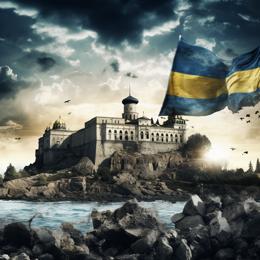Image created by AI
The Enduring Legacy of Alexey Navalny: A Beacon of Hope Against Corruption and Polarisation
The demise of Alexey Navalny, a Russian opposition icon whose audacious defiance agitated the echelons of power in the Kremlin, resonates with a profound echo of loss and unrealized potential in a Russia that stands at the crossroads of its political future. Navalny's legacy is one of unwavering courage, a crusade against corruption, and an attempt to mend a society fractured by decades of authoritarian rule and geopolitical strife.
Navalny's confrontation with the Kremlin was not a mere skirmish in the Russian political arena—it was emblematic of a broader struggle against a culture of impunity that was pervasive amongst the ruling elite. His exposés on corruption amongst top officials, notably through his influential YouTube videos, cut through the noise of state propaganda and a controlled media landscape, fostering a formidable opposition movement that permeated Russia's vast and diverse regions.
Beyond his anti-corruption activism, Navalny was a catalyst for generational change. He represented the aspirations of young Russians, a demographic whose entire political consciousness was shaped under Vladimir Putin's reign. His messaging transcended the traditional dichotomies of Russian politics, engaging liberals, nationalists, and left-wingers alike—a feat that underscores his aptitude for unification in a politically fragmented society.
On a geopolitical level, Navalny's untimely death symbolizes the extinguishing of a beacon of hope for reconciling the widening chasm between Russia and its neighboring countries, Ukraine in particular. Navalny's lineage and personal history presented an opportunity, a possibility for bridging the bitter divide that has culminated in a devastating and protracted conflict.
Critically, Navalny's political narrative was not without its controversies and oscillations. Initially toying with nationalism, he subsequently veered towards a liberal democratic stance that won the support of Western proponents. The evolution of his political identity illustrates the complex fabric of Russia's opposition and raises poignant questions about the nature of political leadership within the domain of Russian and Eastern European politics.
Despite the Kremlin's relentless persecution, Navalny's choice to return to Russia from Germany—post the attempt on his life—demonstrated an indomitable commitment to his country and political mission, one that was inherently Russian at its core. His intention was never to operate as a pawn for Western interests; rather, it was to work from within, even if it meant facing the direst of consequences, in the pursuit of a "beautiful Russia of the future."
The sorrow surrounding Navalny's passing is palpable, not only in the context of Russia's internal dynamics but also for the tentative bridge he could have built amidst the present geopolitical stalemate. The implications of his death reverberate beyond the confines of Russia's borders, heralding a critical juncture for a nation and a region overshadowed by the specter of enduring conflict.
Alexey Navalny's life and political endeavors epitomized the pursuit of justice, transparency, and the unity of a nation divided by distrust and authoritarianism. His memory continues to inspire those left to carry the mantle of his mission, fostering a hope that the seeds he planted may yet flourish in a Russia that is free of corruption and conflict—a vision that remains elusive but not forgotten.










